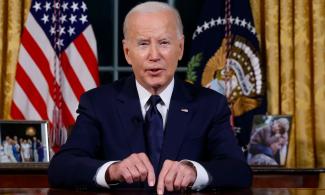
US President Joe Biden has angrily criticised an investigation that found he mishandled top secret files and said he struggled to recall key life events.
In a surprise news briefing on Thursday evening, Mr Biden insisted: "My memory is fine."
BBC reports that Biden slammed a claim that he could not recollect when his son died, saying: "How the hell dare he raise that?"
The inquiry found Mr Biden "wilfully retained and disclosed" classified files, but decided not to charge him.
Department of Justice Special Counsel Robert Hur determined Mr Biden had improperly kept classified documents related to military and foreign policy in Afghanistan after serving as vice president.
The scathing 345-page report, released earlier on Thursday, said the president's memory had "significant limitations".
Mr Hur interviewed the 81-year-old president over five hours as part of the inquiry.
The special counsel said Mr Biden could not recall when he was vice president (from 2009-2017), or "even within several years, when his son Beau died" (2015).
Hur said President Biden will not be charged over his retention of government documents. Hur stated that if Biden were charged, the president could present to a jury “as a sympathetic, well-meaning, elderly man with a poor memory.”
Attorney General Merrick Garland appointed Hur as Special Counsel last year after lawyers for Biden informed the government that the president was in possession of classified documents from his days as a senator and vice president. Hur concluded that Biden “willfully retained” the classified material.
According to Media Ite, Hur’s report describes Biden’s memory in damning terms, at one point stating that it “appeared to have significant limitations.” The report recounts a recorded 2017 conversation with Mark Zwonitzer – who helped Biden write two memoirs – in unflattering terms:
“Mr. Biden’s recorded conversations with Zwonitzer from 2017 are often painfully slow, with Mr. Biden struggling to remember events and straining at times to read and relay his own notebook entries.
“In his interview with our office, Mr. Biden’s memory was worse. He did not remember when he was vice president, forgetting on the first day of the interview when his term ended (“if it was 2013 – when did I stop being Vice President?”), and forgetting on the second day of the interview when his term began (“in 2009, am I still Vice President?”).
“He did not remember, even within several years, when his son Beau died. And his memory appeared hazy when describing the Afghanistan debate that was once so important to him. Among other things, he mistakenly said he “had a real difference” of opinion with General Karl Eikenberry, when, in fact, Eikenberry was an ally whom Mr. Biden cited approvingly in his Thanksgiving memo to President Obama.”
At Thursday night's news conference, an emotional Mr Biden lashed out at the passages casting doubt on his recollection of events.
"Frankly, when I was asked the question I thought to myself, was none of their damn business," he said.
"I don't need anyone to remind me when he [Beau Biden] passed away."
He said he was "very occupied... in the middle of handling an international crisis" when he was interviewed by the special counsel from 8-9 October last year - just as the Israel-Gaza war erupted.
The inquiry also said Mr Biden had shared some of the sensitive material from hand-written notebooks with a ghostwriter for his memoir, a finding that the president denied from the podium.
The special counsel concluded it would be difficult to convict the president of improper handling of files because "at trial, Mr Biden would likely present himself to a jury, as he did during our interview of him, as a sympathetic, well-meaning, elderly man with a poor memory".
Opinion polls indicate the president's age is a concern for US voters ahead of November's White House election. But Mr Biden told reporters on Thursday he was the most qualified candidate.
"I am well-meaning," he said. "And am elderly. I know what the hell I'm doing. I put this country back on its feet.
"I don't need his recommendation."
Asked whether he took responsibility for having classified documents in his home, Mr Biden blamed his staff.
He said he didn't know they had put sensitive memos in his garage, where the special counsel says they were located next to a dog bed.
A BBC reporter at the White House's Diplomatic Reception Room described the atmosphere as tense.
When one journalist said the American people were concerned about his age, Mr Biden raised his voice in reply: "That is your judgement, that is your judgement."
He insisted that his memory is "fine" and "has not gotten worse" during his presidency.
Mr Biden's legal team also criticised the special counsel's remarks about Mr Biden's apparent memory lapses.
"The report uses highly prejudicial language to describe a commonplace occurrence among witnesses: a lack of recall of years-old events," wrote White House lawyer Richard Sauber in a letter attached to the report.
The top secret files were found at Mr Biden's house in Wilmington, Delaware, and former private office from 2022-23.
The discovery came after a separate investigation charged former President Donald Trump, 77, with mishandling classified documents following his departure from the White House. He faces a trial in that case this May.
The Hur report distinguishes between both cases, saying Mr Biden handed over the documents to government archivists, while Mr Trump "allegedly did the opposite".
Even as Mr Biden sought to rebut reporters' questions about his age and mental acuity, he inadvertently mixed up two world leaders.
Asked to comment on the latest in the Israel-Gaza war during Thursday's evening news conference, he confused Mexican President Andrés Manuel López Obrador with Egyptian President Abdul Fattah al-Sisi.
"I think as you know initially," he said, "the president of Mexico, Sisi, did not want to open up the gate to allow humanitarian material to get in."